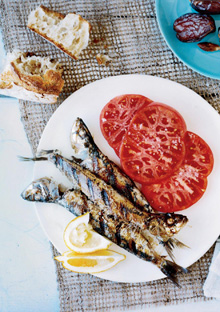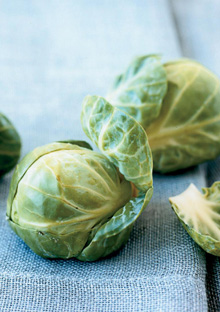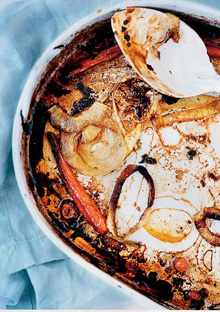
Photo: Ditte Isager
Last year I took the children on holiday to Morocco, where we spent much time feasting, either with our eyes in the market or with our bellies in the cafés and restaurants. One meal in particular marked a highlight. We were staying in Essaouira, a town with such an atmospheric and photogenic medina that it has remained a popular film location since Orson Welles chose to shoot there for his Othello. Setting out from the fishing harbor, we took a camel ride up the coast along vast deserted stretches of windswept golden sand, past the ruined forts and castles, which are said to be the inspiration for the Jimi Hendrix song "Castles Made of Sand." Camel rides are notoriously uncomfortable, except this one wasn't—we lolled back on hugely overstuffed palanquins, going with the motion as if rolling with the waves. After a couple of hours we branched off at a small river and rode inland, seeing nothing but the occasional house and a few tree-climbing goats. When we stopped for lunch, our guide quickly swept together some leaves and twigs as kindling while the children collected bigger sticks. From somewhere in his saddlebags, he produced two dozen sardines, which he had caught that morning, and grilled them on the open fire. There was fresh bread and heavenly tomatoes. For dessert we ate dates. It was the simplest of meals and the most delicious. Why? It had been a long ride, for one thing. Food tastes better when you're hungry. How easy that is to forget! Everything was fresh and unprocessed and tasted of itself, no need for dressing up. And there was time for a doze beneath the acacias while the children fed the leftovers to the camels.
Monica Ali's latest novel, In the Kitchen (Scribner), came out in June.

Next: Walter Mosley's Easy Eatin'
Monica Ali's latest novel, In the Kitchen (Scribner), came out in June.

Next: Walter Mosley's Easy Eatin'

Photo: Ditte Isager
By Walter Mosley
As I live alone and eat at home most nights, I approach cooking in a honed down, almost monastic way. I like a balanced meal that tells me I'm okay even without company or conversation. The ideal meal for me...I stop here to say that cooking relies on one basic rule: the quality of the ingredients. That said, my ideal meal is a boneless rib-eye steak (seasoned with granulated garlic, sea salt, and a mixture of red and black pepper) broiled to medium. I toss a salad of Bibb lettuce with a dressing of olive oil, red vinegar, crushed garlic, coarse ground black pepper, crumbled Gorgonzola cheese, and a tablespoon of port wine. For a vegetable I mince six or seven heads of brussels sprouts and a shallot or two. These I sauté in Irish butter until the greens are almost cooked through. Then I sprinkle in a little soy sauce, cover the pan, and let it simmer for a few minutes. (If there isn't enough liquid in the pan, I might drizzle in a little water to keep the dish from burning.)
Since I'm cutting down on the carbs these days, this is the meal I'd make. But if I'm feeling especially in need of spiritual sustenance, I might add a little basmati rice with sautéed shiitaki mushrooms. And for dessert I'd prepare panna cotta (cooked cream with very little sugar).
Walter Mosley's most recent novel, The Long Fall (Riverhead), was published in March.

Next: Patricia Volk Loves Dirty Food

Photo: Ditte Isager
By Patricia Volk
On the corner of Tchoupitoulas at 401 Poydras Street in New Orleans, you will find Mother's, home of the Ferdi, a sandwich served with "debris." In Louisiana, debris is crusty scraps that drift to the bottom of the pan when you roast meat. In New York we call that "dirt."I love dirty food. Dirt is the stuff people usually throw out, e.g., the rubbery "skin" on vanilla pudding after it's exposed to cold air in the fridge. Dirt is the dark film that forms as cocoa cools in the pot. Break it up with a spoon, stir it in, you've got dirty hot chocolate, nicely unsmooth and imperfect, hence complex.
There are those who will tell you dirty food does little to enhance presentation. But a dirty brisket sandwich would be torment without pan scrapings. I like seeing and eating something that shows it was made by human hand in a slow old-fashioned way. When I'm eating a lemon mousse, while I appreciate the smoothness, discovering a bit of pulp exhilarates. You never have to strain anything for me. Lumps are treasures, and so are little bits of black fat at the bottom of the roasting pan if onions are in it. In Yiddish, these carbonized fat-soaked threads are known as gribenes. People, families, have been known to fight over them. In France, burnt crumbs that collect at the bottom of the skillet when you sauté floured food is fond. Gribenes and fond are why we have Lipitor.
Congealed anything, stuff that leaks between the bread and gets frazzled on the panini maker, hard bits, dried bits, soggy bits, crunch, globs, gobs, and, yes, flecks—anything you might toss even though it has more taste per concentrated morsel than the star of the meal, bring it on. There's a reason the word edible is found in incredible.
Patricia Volk is the author of Stuffed (Vintage) and, most recently, the novel To My Dearest Friends (Vintage).
Back to Eating Well




